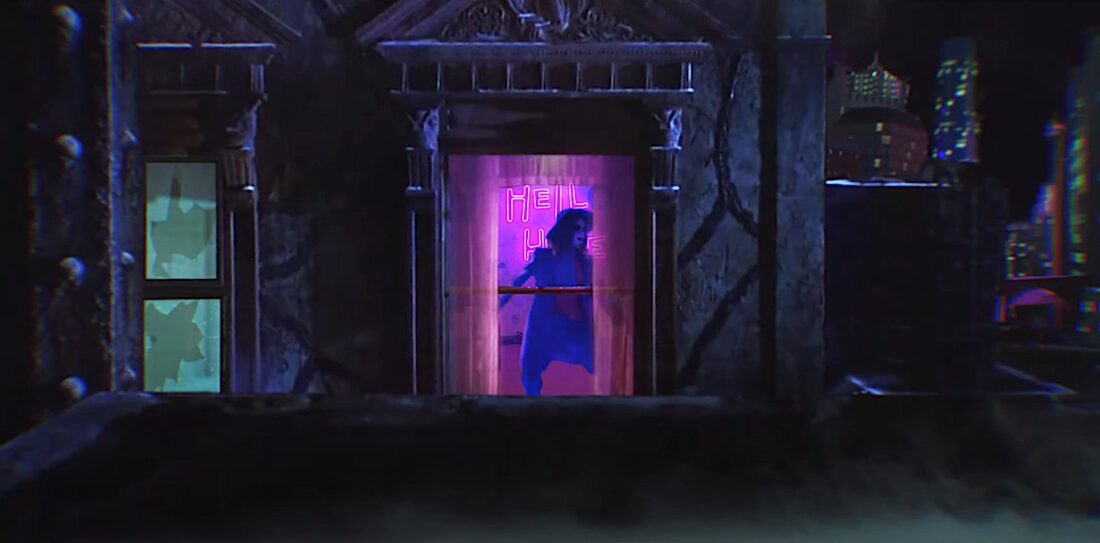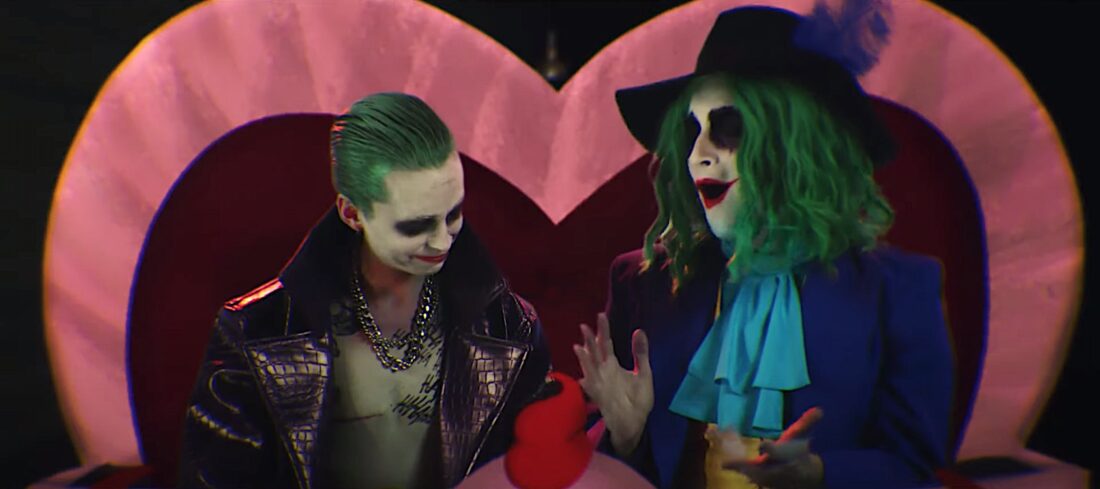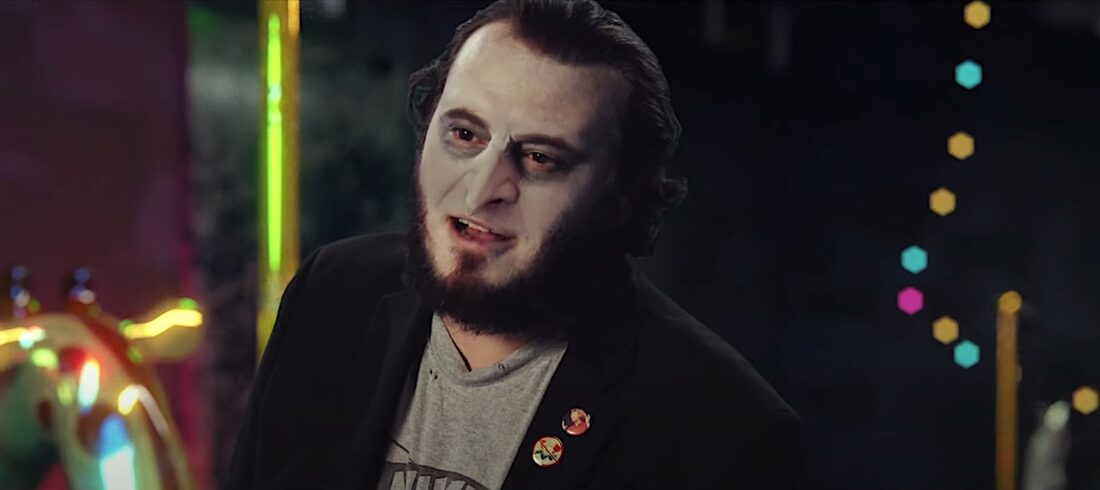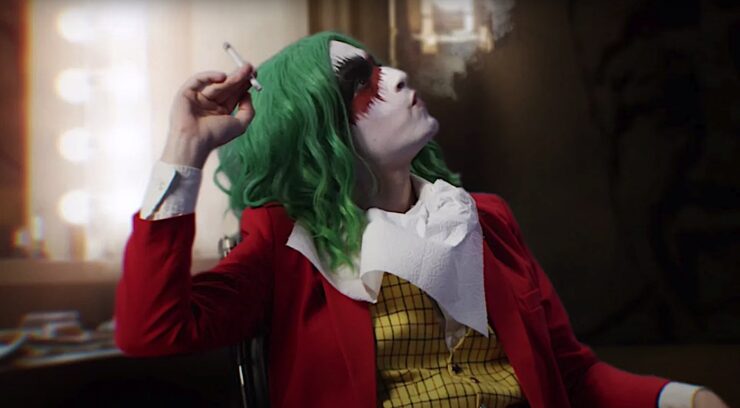How to talk about The People’s Joker?
The rest of this review could consist of the words HAPPY SCREAMING!!! repeated 1200 times and I could hit submit and call it a day and feel pretty good about myself.
HAPPY SCREAMING!!! does sum it up.
The People’s Joker is pure joy. Actual joy, not fake Smylex joy. Even the bits that are horrifying and upsetting are joy! If there was a way to get this movie into my bloodstream without fucking up my PH balance and going into a coma, I would do it.
I think it’s something about the filmmakers’ commitment. The People’s Joker is equally about queerness, and transness, and comedy, and Batman, and being For The People. It is 1000% in on each thread—it’s a great Trans Joker Movie, but an equally great Exploration of Comedy In Modern Society. And it’s a really funny Trans Joker Coming-of-Age Comedy Emotional Abuse Fucked Up Childhood Batman’s Kinda The Villain Except Maybe There Are No Villains movie. It is also for the people. If I had a pink neon sign that said “Hello There” in my room this movie would come in and smash some letters until it said, inexplicably: FOR THE PEOPLE.

Perhaps I’m over-complicating this.
The People’s Joker is about comedy. Editor and director Vera Drew has worked on I Think You Should Leave and Comedy Bang! Bang!, was nominated for an Emmy for Sacha Baron Cohen’s political satire Who Is America?, and worked with Tim and Eric—and that particular thread of 21st Century comedy is woven into every frame of the movie. The film was born from a half-joking request by (eventual co-writer) Bri LeRose for Drew to do her own edit of Todd Phillips’ Joker. The movie grew from there, becoming a pre-vaccine pandemic Monkey Man-esque labor of love that involved Drew, LeRose, Drew’s longtime collaborator Nathan Faustyn, and over 100 other contributors and animators. Our Joker (whose deadname is bleeped out, fuck yeah) begins life as a sad “boy” who can’t express why she feels so out of joint with the world. Like so many of us, she turns to comedy—and like so many of our parents, her furiously normie mother turns to pharmaceuticals. In this case a trip to Arkham Asylum, where the nefarious Dr. Crane (Jonathan, presumably, Frasier and Niles would never) prescribes a jolt of Smylex whenever conforming to an overbearing society becomes too depressing.
Once she escapes to Gotham things are a little better—she can kind of be openly queer, finds some good friends, like Oswald, and embarks on a comedy career. But comedy, like everything in Gotham, is regimented, hierarchical, pretty fascistic, and under the watchful eye of the vigilante known as Batman. It’s also really binary: you can either be a Jokeman, and, you know, tell jokes, or a Harlequin who dances behind the Jokemen being pretty. Our Joker doesn’t like either option—and anyway she’d have to pay for months of expensive classes if she wants to be approved for the cast of the weekly variety show that’s been on TV for years, UCB. But is it worth it for the mentorship from Gotham City’s comedy legend, Ra’s al Ghul? Could there be a different way—perhaps involving an abandoned warehouse and an anti-comedy revolution—that would help Joker and her friends find success on their own terms?

Then there are her relationship issues with another trans comedian, the tattooed Marxist edgelord Mr. J, and the visits from Mom, who is just waiting for her to admit she’s failed and come back home to Smallville.
The People’s Joker is about Batman, and the Joker, and the whole DC Rogue’s Gallery, and the movies and animated series that have been spun out of the comics like so much IP gold. If these characters are archetypes, and these stories are our modern myths, then don’t they belong to all of us?1 Can’t Drew and her ragtag team of comics nerds use them to tell a story about identity and belonging, as long as it credibly falls under parody and fair use laws, which it definitely seems to? Well, according to DC, maybe not. Which is why it’s been showing sporadically at festivals and brief runs in smaller theaters, rather than getting a big rollout like Todd Phillips Joker. (A movie Drew likes, by the way, but which, personally, I wish I could set on fire and then piss on when I get tired of watching the flames eat the celluloid. Kidding, kidding. They didn’t shoot it on celluloid—Warner Bros. thought shooting a film on film would cost too much money.)
When i was in grad school (the first time) (I know, I know) people would talk about their “lenses”—they were studying through a “Lacanian lens” or “the les of Foucault”—and one of the reasons I didn’t do all that well (the first time) was that I never found my “lens”. I never saw one that helped me see any better. The People’s Joker is a trans coming-of-age story told through the lens of Batman. There are so many different Batman riffs in this movie! Like as many as you might think there are from seeing trailers or clips, there are MORE. And they’re good. All the of the supporting characters are reimagined in fun ways that are a joy to watch if you’ve ever loved a Batman movie. Do you love Dr. Chase Meridian? Do you love Poison Ivy? Did you ever wish that Riddler could get his own weird arc that plays out entirely in the background of a movie about a trans Joker in a dystopian Gotham City? Do you love it when Penguin eats a whole fish and pulls the skeleton out of his mouth? Goddamn do I have a movie for you.

And the style is so maximalist and overstuffed and GREAT. Vera Drew’s costuming and make-up changes constantly, some sections are janky live action, some sections are animation of wildly varying styles, there are fight scenes that nod to the 1960s Pop Art Batman, and sequences that parody Suicide Squad. “Party Man” is rewritten. The Joker Stairs are danced upon.
But possibly the very best thing in this no skips banger of a movie is its heart. Joker the Harlequin can’t really become funny until she knows herself better. Her whole life is a performance, so how the fuck is she supposed to perform onstage, too? Or really, more than that: if comedy comes from telling the truth, how can someone who has to lie all the time supposed to be honest in their work? When she does work up a successful routine, it’s, um, complicated. There are a lot of layers. Rather than making the ragtag band of outcasts also a bunch of oppressed geniuses, The People’s Joker is about people who might not be funny enough to be professional comedians, but who use comedy as a lifeline in a bleak world. And that’s good actually. As long as you’re being true to yourself, the jokes will probably, eventually come—and even if they don’t, at least you’ll know who you are.
In Alan Moore’s BBC Maestro Class, our greatest living magus reminds us that writers are magicians. And while that makes me nervous (that’s the kinda shit that’ll go straight to my head and make me genuinely insufferable), I mean, he’s not wrong. By talking about these archetypes and remixing them and re-mx-ing them, by claiming characters and using them to tell this story, Vera Drew and her collaborators have pulled off a powerful work of magic.
Luckily for all of us, Alter Innocence has managed to distribute The People’s Joker in a few places across the US. See if there are any screenings near you, and if there are, throw some green dye in your hair, break out your purplest lipstick, and get to a theater! I assure you it will be an incredible time—and I’m an enby of my word.
- Speaking to The Daily Beast last year, Drew said: “If these are our modern myths, and if the purpose of myth is to learn about the human experience and grow and also chart your progress—the hero’s journey and all that stuff—let’s actually do that earnestly with these characters” ↩︎










